POPULAR TITLES: United Kingdom | Hanbury & Martin Modern Equity 23rd Edition
Hanbury Martin: Modern Equity provides an up-to-date and modern account of this challenging area of the law. This twenty-second edition of the long-standing work is the third edition under the present editors. The new edition contains rigorous analysis of the latest in case law and academic debate, with strengthened reference to other common law jurisdictions. Modern Equity continues to be unparalleled in breadth of scope and wealth of detail and remains the authority on equity and trusts law.
|
| | |
 | Jervis on Coroners 15th Edition
Navigate the landscape of coronial law with Jervis on Coroners. This quintessential guide is the leading resource for anyone involved in a coroners inquest or investigation, taking you step-by-step through the practice and procedure. From the fundamental principles to the complexity of homicide cases, disasters, prescribed diseases and notifiable accidents, this work provides detail and insight across the full spectrum of issues that you might encounter.
Jervis on Coroners is more than just a reference its the key to understanding the nuances of this legal system and the specific powers and duties of the coroner. With a logical structure and all-angles approach it is essential reading for coroners, solicitors and barristers, local government officials and medical examiners. Secure your copy now to ensure that you are equipped with the expertise to handle even the most intricate of cases with confidence and authority.
- The authority on coronial law and its practice in coroner inquests and investigations.
- Consolidates all relevant procedures, rules, materials and legislation to deliver complete guidance on this legal system.
- Explains the classification, appointment and function of coroners and medical examiners and their territorial jurisdiction.
- Covers all matters relevant to beginning an investigation, outlining the basis for a coronial investigation and the required reports and certificates.
- Addresses the scope of an investigation and the four statutory questions: who died, how, when and where?
- Looks at issues of information and publicity such as disclosure, data protection, freedom of information, privilege and coroners powers to obtain such information.
- Guidance on procedures before an inquest, during the preliminaries and at the inquest itself.
- Commentary on special cases of homicide, notifiable accidents and prescribed diseases, treasure and major disasters.
- Outlines post-inquest matters including administration, fees, appeals and statutory and judicial review.
- Additional analysis of the international dimension of coroners and human rights.
- Accompanied with legislation, forms and precedents.
|
| | |
 | Guest & Liew on the Law of Assignment 5th Edition
This title provides you with all the guidance you need on the law governing the voluntary assignment of things in action. It covers the nature of assignment, equitable assignments, restrictions, priorities, liabilities, conflict of law and more. The commentary is clear and concise and follows the approach of titles such as Chitty on Contracts enabling you to find a statement of law and, for each issue or topic, the authority that supports it.
- Defines assignment before outlining and giving examples of choses in action, detailing the requirements for assignment and looking at the relationship of assignment and other transactions.
- Examines the law of assignment under section 136 of the Law of Property Act 1925.
- Goes through equitable assignment and agreements to assign, covering both an equitable assignment of an equitable chose and of a legal chose.
- Deals with restrictions on assignment and covers contractual terms forbidding assignment, prohibition by statute or public policy and personal contracts and covenants.
- Discusses the position of creditors, trustees in bankruptcy and personal representatives of the assignor and the liquidator of an assignor company.
- Analyses the problems associated with priorities including those between competing assignees, competing holders of interests in shares and an assignee and a chargee under a charge created by a company.
- Considers special priority rules and variation of priorities.
- Establishes defences available to the obligor under assignments subject to equities, including defences that impeach the existence or enforceability of the chose in action assigned, set-off, and right of retainer.
- Reviews available financing devices, factoring, block discounts and securitisation.
- Looks at situations where there is assignment of obligations or liabilities.
The fifth edition has been comprehensively updated throughout to ensure you have the latest guidance at your fingertips. Key changes include new discussions on whether a contract reflects a single chose in action or a bundle of choses and an examination of the distinctions between an intention to assign and contractual intention. It also addresses whether the debtor or obligor has a right to sight the assignment.
Other new features of this edition include:
- Additional new commentary on the redaction of documents relied on in court; the effects of backdating an assignment; the doctrine of relation on the assignees interest before the chose is assigned; whether termination of a contract affects a non-assignment clause; and priority between beneficiary under a trust and assignee of the trustee.
- Expanded commentary on relief by way of interpleader; agreements to assign an existing chose in the future; form of writing for equitable assignments of equitable choses; prohibitions on assignment; marshalling; abatement; and equitable set-off.
- Updated with new UK case law including: Promontoria (Oak) Ltd v Emanuel [2021] EWCA Civ 1682, [2022] 1 WLR 2004; Hudson v Hathway [2022] EWCA Civ 1648, [2023] K.B. 345; Farrar (Deceased) v Miller [2021] EWHC 1950 (Ch); Farrar v Miller [2022] EWCA Civ 295; Re Smith [2021] EWHC 1272 (Comm); LA Micro Group (UK) Ltd v LA Micro Group Inc [2023] EWCA Civ 214, [2024] Ch. 1; Phoenix Group Foundation v Harbour Fund II LP [2023] EWCA Civ 36; Dassault Aviation SA v Mitsui Sumitomo Insurance Co Ltd [2024] EWCA Civ 5; and Energy Works (Hull) Ltd v MW High Tech Projects UK Ltd [2022] EWHC 3275 (TCC), 206 Con. L.R. 40
- Relevant cases from other jurisdictions including: Re O''Hara-Tucker [2022] VSC 572 (Australia); Billabong Gold Pty Ltd v Vango Mining Ltd (No. 2) [2023] WASCA 58 (Australia); Winland Finance Ltd v Gain Hero Finance Ltd [2022] HKCFA 3 (Hong Kong); and Gravitas International Associates Pte Ltd v Invictus Group Pte Ltd [2022] SGHC 2 (Singapore).
|
| | |
 | Documentary Evidence 15th Edition
Now in its 15th edition (first published 40 years ago), Documentary Evidence prides itself on being up to date. In the fast-moving world of civil procedure, and the vast amount of caselaw on disclosure and privilege, it is rewritten on a three-year cycle.
The book is a comprehensive guide to the legal obligations of disclosure. Logically presented and lucidly written, it provides detailed analysis and sensible practical advice. Following a chronological structure, it shows when and how a practitioner should take action in relation to the obligation to disclose. It is a standard work that is often cited in court judgments.
Under the Civil Procedure Rules the parties to an action are encouraged to adopt a cards-on-the-table approach toward the exchange of information, not just once litigation has commenced but before as well. It is likely in the early stages that a few documents will be identified as being relevant or key to the matter at hand. These will be used to provide advice as to the merit or not of proceeding with the dispute. If the decision is taken to proceed, the law imposes a requirement to make full and proper disclosure, which is the process whereby the parties to an action disclose to each other all documents in their possession, custody or power relating to matters in question in the action. This title deals with the nature and scope of the obligation to disclose.
Documentary Evidence:
- Provides a comprehensive guide to the principles, obligations and protections of disclosure, legal professional privilege and other aspects of evidence in the form of documents
- Authored by a renowned KC, provides detailed analysis, practical advice and robust views often derived from cases in which he has been personally involved
- Is regularly cited in court, most recently in Al Sadeq v Dechert LLP [2024] EWCA Civ 28, JSC Commercial Bank Privatbank v Kolomoisky [2022] EWHC 868 (Ch), and Recovery Partners GP Ltd v Rukhadze [2021] EWHC 1621 (Comm)
- Discusses in depth the key principles and problem areas of disclosure, and how to raise, or combat, the available defences against it
- Is logically structured by following in chronological order the steps taken in conducting a case, showing the practitioner when and how to take action at each stage
- Advises on how to obtain, assess and manage the documents needed and how to identify the key issues
- Discusses how practices have changed consequent to the fact that most disclosure is now electronic disclosure and the challenges and opportunities presented by this
- Analyses the extent of the powers of regulatory or public bodies to obtain or disclose documents
- Discusses how the Civil Procedure Rules have affected the position on disclosure in important respects from pre-action protocols and powers, to objections to disclosure and inspection, to the practicalities and problem areas of CPR disclosure, to the failure and abuse of disclosure obligations
- Sets out the rights of access to documents, including those held by companies, trusts, partners, receivers and agents, as well as access to court documents, and the means by which data can be accessed
- Explains fully the multi-faceted nature of legal professional privilege what rights different types of privilege provide, their breadth and limits, when and how to claim or waive them
- Explains the courts power to exclude documentary evidence
- Describes the issues and obligations of confidentiality, including the development of the collateral undertaking, or proscriptions against the misuse of information obtained through disclosure, both prior to and under the CPR
- Discusses how to deal with international elements of a case, such as witnesses out of the jurisdiction, evidence in the jurisdiction for foreign proceedings, discovery proceedings abroad, documentary orders against foreign entities, the powers of and principles applied to by the English court, the application of foreign law, etc.
- Includes individual chapters on Witness statements and other written evidence; Expert reports; The Civil Evidence Act 1995; and Powers of Investigation
Whats new for the 15th edition:
- New jurisdictional gateway available for Norwich Pharmacal applications from 1 October 2022 and new Norwich Pharmacal caselaw on multi-jurisdictional applications: Green v CT Group Holdings Ltd 2023 EWHC 3168 (Com)
- Applications out of the jurisdiction for non-party disclosure: Gorbachev v Guriev 2023 2WLR 1
- Iniquity exception and implied waiver: Candey v Bosheh 2022 4WLR 84.
- Standard of proof for iniquity exception and litigation privilege for non-parties: Al Sadeq v Dechert 2024 EWCA Civ 28
- Scope of litigation privilege: Loreley Financing v Credit Suisse Securities (Europe) 2022 EWCA Civ 1484
- Disclosure regimes: separate chapters on PD57AD (successor to the disclosure pilot), CPR 31, and new chapter on other forms of disclosure
- Latest authority on practical control for disclosure purposes
- Disclosure and devices of ex-employees: Various Airfinance Leasing Comaines v Saudi Arabian Airlines Corp 2022 1 WLR 1027, Republic of Mozambique v Credit Suisse International 2022 EWHC 3054 (Comm)
- New authorities on shareholder privilege: Various Claimants v G4S plc 2023 EWHC 2863 (Ch)
- Document destruction: EDF Man V Come Harvest 2022 EWHC 229 (Comm), Giddens v Frost 2022 EWHC 1022 (Comm)
- Latest authority on PD57AC (witness statements): MAD Atelier International BV v Manes 2021 EWHC 1899 (Comm), Mansion Place Ltd v Fox Industrial Services Ltd 2021 EWHC 2747 (TCC)
- Creation of Hollander Orders concerning redactions following JSC Commercial Bank Privatbank v Kolomoisky [2022] EWHC 868 (Ch) and Recovery Partners GP Ltd v Rukhadze [2021] EWHC 1621 (Comm)
|
| | |
 | McGregor on Damages 22nd Edition
A primary reference tool on the general principles and the particular aspects of common law damages, McGregor on Damages is still the leading authority on damages and has been for 60 years. Provides comprehensive coverage of the law of damages, from detailed consideration of the general principles of damages to specific heads of damages and the operation of damages in many specific areas of law.
- Clarifies complex areas including loss of a chance, mitigation, causation, and exemplary damages
- Explains difficult and rapidly developing heads of damages such as licence fee damages, vindicatory damages
- Includes consideration of the operation of money awards in equity including equitable damages, equitable compensation and disgorgement of a defendant''s profits
- Examines specific issues as periodical payments, breaches of undertakings as to damages, damages, and interest on damages
- Goes through the statement of case, the trial and appeals
- Considers damages in relation to particular contracts, torts and human rights such as below:
Contracts
- Sale of Goods, Hire and Hire-purchase of Goods, Sale of Land, Contracts to Pay or to Lend Money, Contracts for Carriage, Contracts of Employment, and Contracts for Professional Services
Torts
- Torts affecting Goods: Damages and Destruction, Misappropriation, Torts Affecting Land, Torts Causing Personal Injury, Torts Causing Death, Assault and False Imprisonment, Malicious Institution of Legal Proceedings, Defamation, Economic Torts, Misrepresentation, Infringement of Privacy, Confidence and Private information, and Misfeasance in Public Office
Human Rights
- Comprehensive examination of damages under the Human Rights Act 1998 including the claims for which these damages are available, the circumstances when they will be available, and their quantum.
The 22nd edition contains a number of significant new features:
- Each and every chapter of the book''s chapters has been updated and many have been very substantially revised.
- An entirely new chapter on Equitable Damages, featuring the operation of damages awarded under s 50 of the Senior Courts Act 1981 (commonly described as Lord Cairns'' Act damages) as well as the different types of equitable compensation and how they differ from "equitable debt".
- Coverage of significant recent case law developments in the law of damages including: Lloyd v Google LLC [2021] UKSC 50; [2022] AC 1217 (data protection and licence fee damages) Manchester Building Society v Grant Thornton UK LLP [2021] UKSC 20; [2022] AC 783 and Meadows v Khan [2021] UKSC 21; [2022] AC 852 (scope of a defendant''s duty and remoteness of damage); Financial Conduct Authority v Arch Insurance (UK) Ltd [2021] UKSC 1; [2021] AC 649 and Davies v Frimley Health NHS Foundation Trust [2021] EWHC 169 (QB) (causation of loss); K Line Pte Ltd v Priminds Shipping (HK) Co Ltd ("The MV Eternal Bliss") [2021] EWCA Civ 1712; [2022] 3 All ER 396 (demurrage); Henry v Attorney-General of St Lucia [2023] UKPC 41, R (Abulbakr) v Secretary of State for the Home Department [2022] EWHC 1183 (Admin) and Oluponle v Home Office [2023] EWHC 3188 (KB) (false imprisonment); Armstead v Royal Sun Alliance Insurance Co Ltd [2024] UKSC 6 and Charles B Lawrence & Associates v Intercommercial Bank Ltd [2021] UKPC 30 (remoteness of damage); E D & F Man Capital Markets Ltd v Come Harvest Holdings Ltd [2022] EWCA Civ 1704 (mitigation of loss); Attorney General of Trinidad and Tobago v JM (a minor by his kin and next friend NM) [2022] UKPC 54 (vindicatory damages); Arsalan v Rixon [2021] HCA 40; (2021) 274 CLR 606 (damage to goods); Tuke v Hood [2022] EWCA Civ 23; [2022] QB 659 (deceit); Swift v Carpenter [2020] EWCA Civ 1295; [2021] QB 339 (personal injury).
- Explanation of the various ranges of damages for false imprisonment, defamation, harassment and misuse of private information.
- Attention to recent legislative amendments and important decisions in jurisdictions other than England and Wales, particularly Northern Ireland, Scotland, Australia, Canada, and the United States.
- Discussion and explanation of significant developments in relation to damages for personal injury, professional negligence, breach of privacy and misuse of private information, defamation, consequential loss and indemnity clauses, economic loss, aggravated and exemplary damages, vindicatory damages and many more.
|
| | |
 | Terrell on the Law of Patents 20th Edition
Now in its twentieth edition, Terrell on the Law of Patents has been the leading authority on UK patent law since 1884. It provides the most detailed and authoritative commentary on law, practice and procedure comprehensively covering every stage from application to infringement. It advises on the fundamental aspects of patent law as well as more specialist issues such as FRAND and SPCs. Regularly cited in court, Terrell continues to set the standard by which others are compared and is an essential reference to keep you up to date with the very latest patent law developments.
- Includes the most significant and relevant case law from all levels of the UK Courts, the European Patent Office, the UK Patent Office and the Appeals Boards.
- Explains the application process for UK national patents and European patents.
- Addresses the issue of entitlement and answers the key questions: who may apply for a patent and who may be granted a patent?
- Discusses how to apply for a supplementary protection certificate, the conditions for granting SPCs and their effects.
- Covers FRAND licensing, undertakings and the nature and scope of obligations.
- Outlines the grounds for revocation as defined by the Patents Act 1977.
- Looks at different types of invalidity including lack of novelty, obviousness and insufficiency.
- Clarifies the principles of patent infringement to ascertain whether or not there has been an infringement, as well as outlining statutory exceptions and other defences.
- Discusses actions for infringement and looks at the parties involved, claims forms, trial procedure and remedies.
- Commentary on second medical use claims, human genome sciences and central amendments to patents.
- Explains compulsory licenses and licenses of right.
- Includes a new chapter on plausibility, discussing the criterion for a valid patent claim and addressing the questions: what is the standard of plausibility and what must be rendered plausible?
- Another new chapter on defences to infringement, examining the distinction between statutory and non-statutory defences as well as infringement with respect to the European Patent Convention, Patent Co-operation Treaty and Community Patent Convention.
|
| | |
 | Insights into IFRS 20th Edition
pplying IFRS® Accounting Standards to real transactions and arrangements can be a significant challenge. As the reporting landscape is changing, communicating effectively to investors and other stakeholders has never been more important. Insights into IFRS is based on KPMG member firms’ experience of applying IFRS Accounting Standards around the world and explains our views on many interpretative issues. We’ve taken the questions that we’ve received and turned them into practical guidance to help you apply IFRS Accounting Standards to your situation.
Key features:
- Practical guidance for preparing and interpreting financial statements
- Clear and insightful analysis of technical accounting issues
- Real-life examples illustrating practical application
- The latest thinking on IFRS Accounting Standards, including forthcoming requirements and future developments
- An appendix of currently effective and forthcoming requirements
New to this edition:
- newly effective requirements for companies reporting at 31 December 2023, including:
- material accounting policy information;
- distinguishing between accounting policies and accounting estimates; and
- deferred taxes;
- new guidance on:
- voluntary carbon credits;
- Pillar Two taxes;
- dual use property; and
- enhanced guidance on:
- the new insurance contracts standard; and
- leases
|
| | |
 | Glanville Williams: Learning the Law 18th Edition
|
| | |
 | Chalmers and Guest on Bills of Exchange and Cheques 19th Edition
Chalmers and Guest provides the definitive guide to the Bills of Exchange Act 1882 and the Cheques Act 1957, and offers legal practitioners comprehensive guidance to the law and practice relating to bills of exchange, cheques and promissory notes.
- Offers comprehensive guidance on the law and practice relating to bills of exchange, cheques and promissory notes
- Provides a section-by-section commentary to the primary legislation, the Bills of Exchange Act 1882 and the Cheques Act 1957
- Explains in detail what provisions the legislation contains, and provides opinion and guidance on how to comply
- Presents a selection of precedents to assist the reader in communications as well as court proceedings
- Illustrates common situations where problems may arise, and works through the legal consequence
- Covers legal capacity for entering into a payment contract
- Addresses consideration, and how the rules governing it diverge from contract law
- Considers how bills may be transferred from one person to another
- Sets out the general duties of the holder, including the necessary steps to fix the maturity of the instrument
- Identifies the liabilities of the parties
- Looks at discharge of a bill, including circumstances where payment is insufficient to discharge the bill
- Details the law governing lost, destroyed or split bills as well as crossed cheques
- Examines the applicable law where parties are based in different jurisdictions, and conflict of laws
- Reflects the changes introduced by Small Business, enterprise and Employment Act 2015 on bills of exchange and cheques: in particular the changes concerning electronic payment of bills
Major changes detailed in the new 19th edition include:
- The Electronic Trade Documentation Act 2023, which creates a new (and entirely separate) mechanism for creating and transferring electronic bills of exchange and which deems electronic bills of exchange which circulate on an electronic trade platform to be equivalent to paper bills
- The cessation of paper cheque clearing and the adoption of the Image Clearing System (ICS) by Pay.UK, which saw all cheques being cleared as images
- Important new cases, including Teva Canada Ltd. v. TD Canada Trust
- Considers the position in Philipp v Barclays Bank UK as regards cheques
|
| | |
 | Formation and Variation of Contracts 4th Edition
Formation and Variation of Contracts deals with topics fundamental to the question of enforceability of promises made and how contracting parties can ensure their transactions are legally effective.
FEATURES:
- Draws together in single volume key issues relating to the formation and variation of contracts, focusing on the rules for their existence and validity
- Brings together topics which are of fundamental importance to practitioners advising on the negotiation or validity of contracts, but on which there is no up-to-date specialist work
- Traces the continuing development of the rules, as a response to changes within the English law of contract and to learn from developments being made in other legal systems
- Highlights areas of contract law where there is likely to be significant debate about possible development in the coming years
- Provides a perspective on the rules for the formation of contracts from an international and comparative dimension
- Includes discussion throughout the book of difficult issues relating to contract formation as they arise in practice
- Part I is devoted to pre-contractual negotiations (including remedies where negotiations fail to reach agreement) and finding the agreement through offer and acceptance
- Part II is devoted to formalities, both in general and in contract in particular, including contracts for the sale of land, consumer contracts, contracts of guarantee and deeds
- Part III is devoted to the requirement of consideration (which gives contract its character as a bargain in the common law), both in the formation of a contract, and in the variation of an existing contract
- Part IV is devoted to promissory estoppel, both its traditional role in the modification of a contract and its potential to develop in English law (noting how other common law jurisdictions such as the US and Australia have developed it)
NEW TO THIS EDITION:
Professor Cartwright considers all relevant recent developments, including:
- the developing case law on duties of good faith in negotiation or renegotiation of contracts, noting particularly recent decisions through which the English courts may be becoming more open to giving effect to an express obligation to negotiate or renegotiate in good faith, whilst not accepting a general implied duty to negotiate or renegotiate in good faith;
- cases on the scope of a claim in unjust enrichment where the negotiations for a contract break down, intention to create legal relations, certainty of agreement, formation of the contract following a battle of forms between the parties negotiating a contract, establishing the parties agreement to the variation (including by novation) of an existing contract, and applying the doctrine of consideration;
- the continuing discussion about the role of emerging technologies in the formation of contracts, including recent work by the Law Commission and other agencies on smart legal contracts;
- cases on the interpretation and application of statutory formality requirements for contracts and deeds, and the use of doctrines of estoppel and constructive trust to give effect to transactions which fail to comply with formality requirements;
- the continuing reception (both positive and negative) by case law and commentators in England and in other common law jurisdictions of the decision of the Supreme Court in MWB Business Exchange Centres Ltd v Rock Advertising Ltd (2018) in relation to the binding force of no oral modification clauses;
- the significance for topics discussed in the book of the withdrawal of the United Kingdom from the European Union; this includes changes made to the EU law retained within English law after the end of the EU withdrawal agreement implementation period, and the impact of the Retained EU Law (Revocation and Reform) Act 2023 and other legislation, already passed or currently in progress or planned, to remove legislative provisions which derive from EU law.
|
| | |
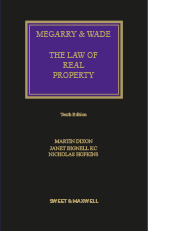 | Megarry & Wade The Law of Real Property 10th Edition
|
| | |
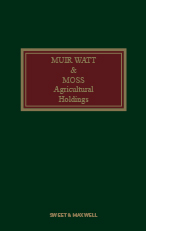 | Muir Watt & Moss: Agricultural Holdings 16th Edition
|
| | |
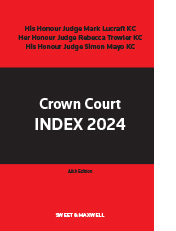 | Crown Court Index 2024 44th Edition
|
| | |
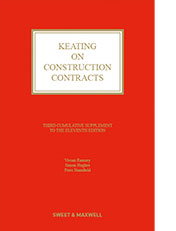 | Keating on Construction Contracts 11th Edition, 3rd Supplement
|
| | |
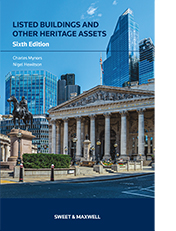 | Listed Buildings and Other Heritage Assets 6th Edition
|
| | |
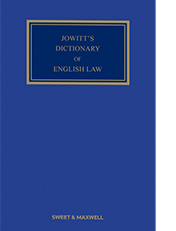 | Jowitt's Dictionary of English Law 6th Edition
|
| | |
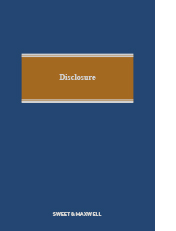 | Disclosure 6th Edition
|
| | |
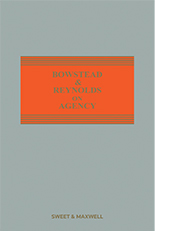 | Bowstead and Reynolds on Agency 23rd Edition
|
| | |
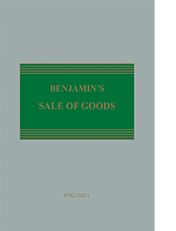 | Benjamin's Sale of Goods 12th Edition
|
| | |
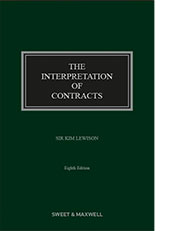 | The Interpretation of Contracts 8th Edition
|
| | |
 | Kerly's Law of Trade Marks and Trade Names 17th Edition
|
| | |
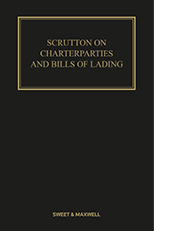 | Scrutton on Charterparties and Bills of Lading 25th Edition
|
| | |
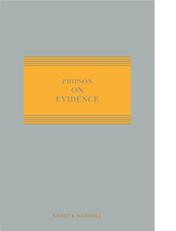 | Phipson on Evidence 20th Edition Mainwork + Supplement
Part of the Common Law Library series, Phipson on Evidence is the leading work on civil and criminal evidence. It examines in detail all aspects of the principles and procedures making up the law of evidence. Coverage includes the admission of evidence, the standard of proof, the attendance of witnesses, good and bad character, legal professional privilege, hearsay, expert evidence, confessions, judicial discretion and many other evidential issues. Key Features - Leading work and authority on civil and criminal evidence, frequently quoted in court
- Written by a prominent team of expert authors, with excellent balance between leading practitioners and academics
- Fully updates all changes brought in by the Civil Procedure Rules and the Criminal Procedure Rules
- Examines in detail all aspects of the complex principles and procedures which make up the law of evidence including admission of evidence, evidence taken or served prior to a trial, the rules of evidence during the course of a trial and the examination of witnesses
- Considers the burden and standard of proof
- Discusses all aspects of good and bad character
- Includes analysis of privilege and facts excluded by public policy
- Examines hearsay in civil and criminal proceedings
- Looks at the exclusion and inclusion of extrinsic evidence
- Examines the judicial discretion to admit or exclude evidence
- Considers a broad range of case law, including that of the Commonwealth
New to this supplement The First Supplement to the Twentieth Edition covers all the latest developments in the law of evidence since publication of the Twentieth Edition in December 2021. These include important decisions on admission of evidence, the standard of proof, the attendance of witnesses, good and bad character, legal professional privilege, hearsay, expert evidence, confessions, judicial discretion and many other evidential issues. The supplement also considers important decisions from the Supreme Court and Court of Appeal such as R. v Carlos Wright [2022] EWCA Crim 1722, and AIC Ltd v Federal Airports Authority of Nigeria [2022] UKSC 16 to name a few. Also available as an eBook on Thomson Reuters ProView Thomson Reuters ProView is custom built for legal professionals like you. |
| | |
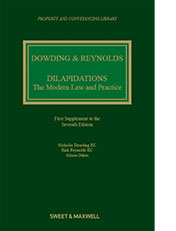 | Dilapidations: The Modern Law and Practice 7th Edition, 1st Supplement
|
| | |
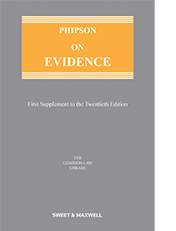 | Phipson on Evidence 20th Edition, 1st Supplement
|
| | |
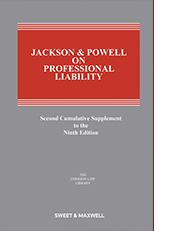 | Jackson & Powell on Professional Liability 9th Edition, 2nd Supplement
|
| | |
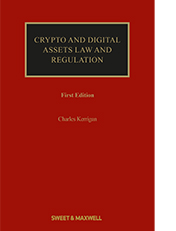 | Crypto and Digital Assets Law and Regulation
|
| | |
 | Hollington on Shareholders' Rights 10th Edition
Hollington on Shareholder''s Rights provides guidance for readers on the statutory remedies for the protection of minority shareholders with coverage/guidance also of articles of association and shareholders'' agreements; the fiduciary duties of directors; restrictions on the power of the majority under general principles of equity and the principles of partnership law (such as good faith) which have been adopted in company law.
The new edition references the multitude of cases (particularly appellate) decided in the common law world and other developments since the last edition, requiring substantial rewriting of the text on many topics. Highlights are:
- Majority Rule- review of principles of abuse and excess of power and fraud in equity principles in Grand View Private Trust [2022] UKPC 47
- Bargain between shareholders - Re Compound Photonics Group Ltd [2022] EWCA Civ 1371 (contractual duty of good faith); Barton v Morris [2023] UKSC 3 (contractual interpretation, express and implied terms); Tulip Trading Ltd v Bitcoin Association for BSV [2023] EWCA Civ 83 (fiduciary relationships)
- Directors duties- BTI 2014 LLC v Sequana SA [2022] UKSC 25 and Stanford International Bank Ltd. v HSBC [2022] UKSC 34 (interests of creditors); ClientEarth v Shell [2023] EWHC 1137 and 1187 (Ch) (interests of members as a whole; derivative claim); duty to act for proper purpose where purposes mixed; Burnell v Trans-Tag Ltd Anor [2021] EWHC 1457 (Ch) (the leaving director)
- Derivative claims- McGaughey v Universities Superannuation Scheme Ltd [2023] EWCA Civ 873 (common law derivative claims and fraud on minority); changes to CPR 19; Boston v Szerelmey [2020] EWHC 1136 (Ch), [2020] EWHC 3042 (Ch) and [2022] EWHC 2849 (Ch) and Leslie v Ball [2023] EWHC 1771 (Ch) (costs indemnity)
- Unfair Prejudice Principles - Re Compound Photonics Group Ltd [2022] EWCA Civ 1371; Financial Technology Ventures II (Q) LP v ETFS Capital Ltd [2021] JCA 176; Chu v Lau [2020] UKPC 24 (breakdown of trust and confidence; exclusion from management); Ming Siu Hung v JF Ming Inc [2021] UKPC 1 and Kwik v Yao [2022] UKPC 52 (ignoring minority; appeals; remedy); Re Coinomi Ltd [2022] EWHC 3178 (Ch) (relationship with derivative claim); FamilyMart China Holding v Ting Chuan [2023] UKPC 33 (ouster of court by arbitration agreement)
- Unfair Prejudice Remedies- Ming Siu Hung v JF Ming Inc [2021] UKPC 1 (share purchase order); Otello Corp ASA v Moore Frres and Co LLC [2020] EWHC 3261 (Ch), Smith v Smith [2022] EWHC 1035 (Ch), Re Cardiff City Football Club (Holdings) Ltd [2022] EWHC 2023 (Ch), Krishna Holdco Ltd v Gowrie Holdings Ltd [2023] EWHC 1538 (Ch) (discount for minority shareholding)
- Just and equitable winding up - Chu v Lau [2020] UKPC 24; Ming Siu Hung v JF Ming Inc [2021] UKPC 1; Duneau v Klimt Invest SA Plc [2022] EWHC 596 (Ch) (loss of substratum)
- Personal rights - Broadcasting Investment Group Ltd v Smith [2021] EWCA Civ 912, Allianz Global Investors GmbH v Barclays Bank plc [2022] EWCA Civ 353, Burnford v Automobile Association Developments Ltd [2022] EWCA Civ 1943 (reflective loss); Rossendale BC v Hurstwood Properties [2021] UKSC 16 (piercing the corporate veil)
- Miscellaneous rights the Take-Private merger and consolidation process under ss. 232-239 of the Cayman Islands Companies Act is now covered in detail, particularly for the light it sheds on share valuation methodology, practice and procedure.
|
| | |
 | Equity & Trusts in Australia, 8th Edition
The eighth edition of Equity and Trusts in Australia remains the leading text for students of equity and trusts. It continues to provide a comprehensive, but at the same time, accessible coverage of the law of equity and trusts in Australia. Equity and Trusts in Australia places that law in the context of developments, both judicial and legislative, in other common law countries. At the same time, it adopts a critical analysis in areas of uncertainty, and makes very frequent reference to the views of commentators from Australia and elsewhere.
The detail and breadth of coverage of this book make it authoritative, as evidenced by its multiple citations in superior courts in Australia and elsewhere. This text is therefore an essential resource for the practitioner. Its accessible style, coupled with an accompanying casebook that adopts the same chapter order and structure, also makes the work ideal for students. Together they mark the work as unique in Australian equity and trusts
CLICK HERE, USE PROMO CODE: AUS0823 to buy the title at a special discounted price. Offer valid till valid from now until 31 August 2023.
|
| | |
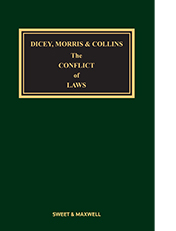 | Dicey, Morris & Collins on the Conflict of Laws 16th Edition Mainwork + Supplement
Dicey, Morris Collins on The Conflict of Laws is renowned worldwide as the foremost authority on private international law. It explains the rules, principles and practice that determine how the law of England Wales relates to other legal systems. Its commentary, Rules and illustrations, with detailed reference to international conventions, legislation and case law, ensures it remains an indispensable tool for practitioners engaged in cross-border matters.
Across two volumes and a Companion Volume, it contains high-quality and detailed analysis. Volume 1 deals with general principles, the effects of withdrawal by the United Kingdom from the European Union, foreign affairs and the conflict of laws, procedural issues relating to international litigation, jurisdiction, recognition and enforcement of foreign judgments and arbitration. Volume 2 deals with a number of specific areas of law. It addresses family law, property law, succession and trusts, corporations and insolvency and the law of obligations. A Companion Volume considers in greater detail the transitional issues arising from the United Kingdoms withdrawal from the European Union and the relevant EU legislation in a number of key areas.
The First Supplement to the 16th Edition brings the Main Work up-to-date. It deals with all developments since the publication of the Main Work.
Important developments considered in the First Supplement to the 16th Edition include:
- Detailed commentary on the revisions to the grounds for service out of the jurisdiction applicable from October 1, 2022.
- All the many new High Court and appellate cases on jurisdiction and enforcement of foreign judgments.
- Authorities on the enforcement of arbitration agreements.
- Analysis of new authorities on foreign affairs and the conflict of laws.
- Important new decisions on aspects of cross-border family law.
- New decisions on the interpretation of the rules on choice of law for contractual and non-contractual obligations and property.
- Consideration of case law on transitional issues arising following the withdrawal by the United Kingdom from the European Union.
Also available as an eBook on Thomson Reuters ProView
Thomson Reuters ProView is custom built for legal professionals like you. |
| | |
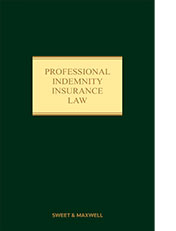 | Professional Indemnity Insurance Law 3rd Edition
|
| | |
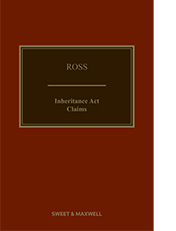 | Inheritance Act Claims 5th Edition
|
| | |
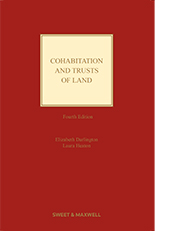 | Cohabitation and Trusts of Land 4th Edition
|
| | |
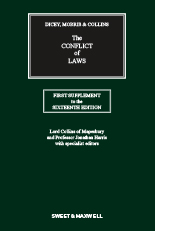 | Dicey, Morris & Collins on the Conflict of Laws 16th Edition 1st Supplement
|
| | |
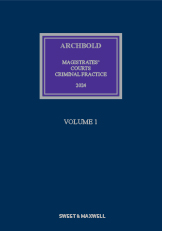 | Archbold Magistrates' Court Criminal Practice 2024
|
| | |
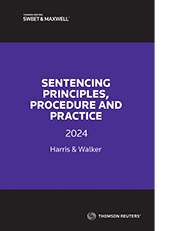 | Sentencing Principles, Procedure and Practice 2024
|
| | |
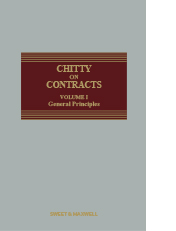 | Chitty on Contracts 35th Edition, 2 volumes
|
| | |
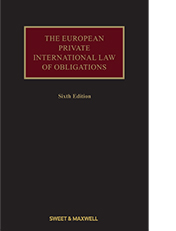 | European Private International Law of Obligations 6th Edition
|
| | |
 | Equity & Trusts 7th Edition
|
| | |
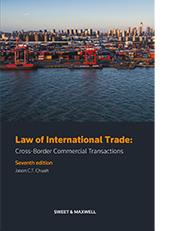 | Law of International Trade 7th Edition
|
| | |
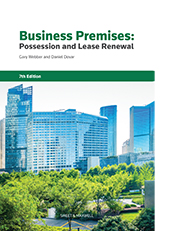 | Business Premises: Possession and Lease Renewal 7th Edition
|
| | |
 | Equity & Trusts 7th Edition
|
| | |
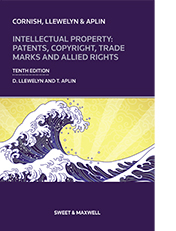 | Intellectual Property: Patents, Copyrights, Trademarks & Allied Rights 10th Edition
|
| | |
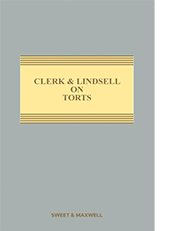 | Clerk & Lindsell on Torts 24th Edition
Clerk Lindsell on Torts, one of our flagship titles and part of the Common Law Library series, is an essential reference tool which is widely referred to by practitioners and cited by the judiciary throughout the UK and the Commonwealth, and also forms the point of reference worldwide for those wishing to research the English law of torts. It offers the most comprehensive coverage of the subject, providing the end user with indispensable access to current, frequent and unrivalled authoritative information on all aspects of tort law.
Key Features:
- Provides unrivalled breadth and depth of coverage on all areas of tort law
- Sets out both general principles and the detailed rules of liability affecting specific torts
- Explains in detail general matters, such as defences, joint liability and vicarious liability, and capacity and parties
- Covers all the important heads of tortious liability: negligence, breach of statutory duty, professional liability, product liability and occupiers liability, malicious prosecution and abuse of process, wrongful interference with goods, deceit, to trespass to land and to the person. Other chapters range from liability for animals to nuisance and Rylands v Fletcher, and from malicious falsehood to the economic torts, defamation, breach of confidence and misuse of private information
- Deals extensively with the vital topic of damages and other remedies, including injunctions
- Covers limitation in detail
- Takes full account of the effects of Brexit
New material in the Twenty-Fourth Edition:
- Henderson v Dorset Healthcare University NHS Foundation Trust and Stoffel Co v Grondona on the extent of the illegality defence in tort.
- FCA v Arch Insurance (UK) Ltd on the subject of adequate causation.
- Okpabi v Royal Dutch Shell Plc on the duty of care owed by a holding company for the acts of its subsidiaries abroad.
- Toombes v Mitchell on the boundaries of wrongful birth and wrongful life.
- Bell v Tavistock Portman NHS Foundation Trust on older childrens ability to consent to medical procedures.
- Allsop v Banner Jones Ltd on solicitors negligence claims and abuse of process.
- Rihan v Ernst Young Global Ltd on employers duties to look after employees interests.
- Leeds City Council v Barclays Bank Plc on the requirement for a representation in the tort of deceit.
- Duchess of Sussex v Associated Newspapers Ltd on misuse of private information and breach of copyright.
- Kawasaki Kisen Kaisha Ltd v James Kemball Ltd on how far the deliberate defunding of a company can amount to an economic tort.
- Swift v Carpenter on damages for serious injury and funding the purchase of a suitable property for a seriously disabled claimant.
- Canada Goose UK Retail Ltd v Persons Unknown and Boyd v Ineos Upstream Ltd on property, injunctions, protests and human rights.
Also available as an eBook on Thomson Reuters ProView
Thomson Reuters ProView is custom built for legal professionals like you. |
| | |
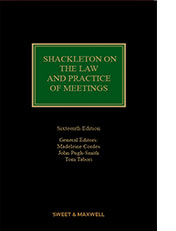 | Shackleton on The Law and Practice of Meetings 16th Edition
|
| | |
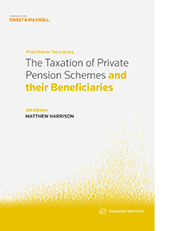 | Taxation of Private Pension Schemes and their Beneficiaries, The 6th Edition
|
| | |
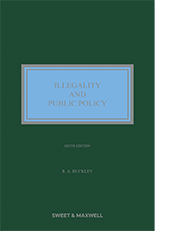 | Illegality and Public Policy 6h Edition
|
| | |
 | Shackleton on The Law and Practice of Meetings 16th Edition
|
| | |
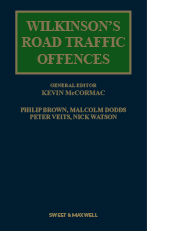 | Wilkinson's Road Traffic Offences 31st Edition
|
| | |
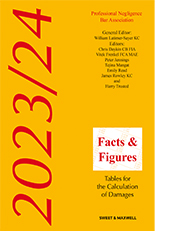 | Facts & Figures 2023/24 28th edition
|
| | |




















































